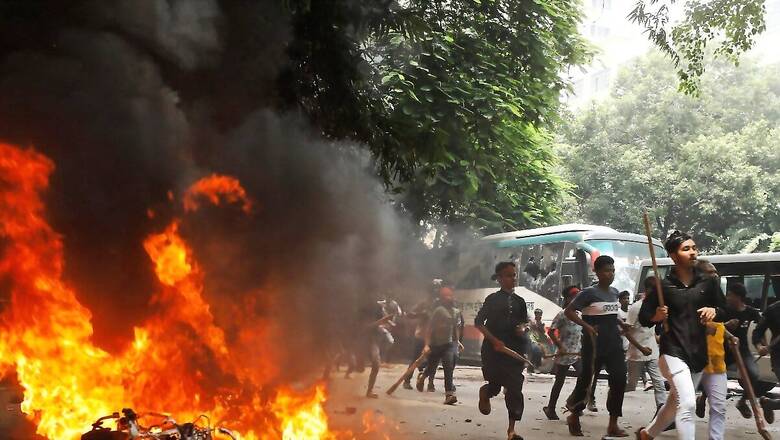
views
Since the unceremonious ousting of Sheikh Hasina from the position of Prime Minister of Bangladesh and the formation of an interim government led by Nobel Prize laureate Muhammad Yunus, there has been significant discussion in both the Bangladeshi and Indian media regarding India’s relationship with post-Hasina Bangladesh. The discussion in the Bangladeshi media centres around how the Narendra Modi-led government erred by placing all its eggs in Sheikh Hasina’s basket and is focused on advising India to build relations with the people of Bangladesh. Indian liberals are also parroting this argument and offering similar advice to the Bangladeshi media.
Sheikh Hasina Seeking Refuge in India is Not Unusual
It is true that the Government of India, under the leadership of Narendra Modi, elevated relations with Sheikh Hasina-led Bangladesh to new heights. However, it is also true that India’s relations would have remained cordial if there had been a Congress-led government or a Third Front government supported by the Left. This is because the Congress, BJP, and the Left parties have always maintained friendly relations with Hasina’s Awami League, the party founded by her father, Sheikh Mujibur Rahman. The Awami League is considered a moderate party, and as a result, political parties in India, irrespective of their ideologies, share warm relations with it. Importantly, both Mujibur and Hasina, during their respective tenures, have consistently maintained friendly relations with India.
So, Sheikh Hasina seeking refuge in India after fleeing Bangladesh is not unusual. This is not the first time it has happened. She also took shelter in India after her father, Mujibur Rahman, the then-ruler of Bangladesh, was assassinated along with other family members in 1975. However, Hasina’s decision to seek refuge in India has become a point of discussion on social media in Bangladesh, as well as in their mainstream media.
It is true that the anti-quota movement led by students against Hasina was largely democratic in nature. It is also true that over the years, Hasina has shifted from being a democrat to becoming an authoritarian leader. Given the brutal manner in which she attempted to crush the largely peaceful students’ protests, resulting in the deaths of hundreds of students, it is understandable that there is now strong anti-Hasina sentiment across the neighbouring country. Furthermore, her decision to take refuge in India has exacerbated this anti-sentiment, turning it into anger against India.
Hasina is Just a Pretext for Anti-India Sentiment
Blaming India for giving refuge to Hasina as the main reason behind the rise of anti-India sentiment in Bangladesh is a naive argument. While it is true that New Delhi supported Hasina, who, after becoming prime minister in 2009, acted against Indian terrorists hiding in Bangladesh, it is also a fact that blaming India for the farcical 2014, 2018, and 2024 general elections, which occurred under Hasina’s rule to strengthen her authoritarian power, is merely a pretext. It is quite amusing that those Bangladeshi commentators who complain about India’s “big brother attitude” towards its neighbours are simultaneously expressing anger at India for refusing to interfere in Bangladesh’s internal affairs by dictating to Hasina how to conduct elections over the last decade!
To be fair, New Delhi was never opposed to democratic elections in Bangladesh. It should be noted that back in 2017, the then-Indian foreign minister, Sushma Swaraj, during her visit to Bangladesh, also met with a Bangladesh Nationalist Party (BNP) delegation led by former prime minister Khaleda Zia. Regarding the meeting, BNP’s then-general secretary, Fakhrul Islam Alamgir, stated that Swaraj told the delegation that India expected a fair election—referring to the 2018 general election—with the participation of all parties. Let’s also not forget that Swaraj’s meeting with Zia took place despite opposition from the Awami League.
It’s the rise of Islamism that is fuelling anti-India sentiments
This year, when Sheikh Hasina was elected for a fourth consecutive term through a farcical election, it wasn’t only India that congratulated her—China, another significant regional partner, also extended its congratulations to Hasina. Russia, too, offered its congratulations. However, India is primarily blamed for supporting Hasina’s undemocratic election, despite the fact that India has consistently advocated for a fair and participative democratic process in Bangladesh.
In reality, it’s the rise of Islamism that is fuelling the anti-India sentiments across Bangladesh. This rise of Islamism didn’t happen suddenly. After the assassination of Mujibur Rahman, under whose leadership a secular constitution was established, successive military dictators overturned the secular constitution, steering the country towards Islamisation and closer ties with Pakistan.
Let’s not forget that during the freedom struggle, there was a faction that strongly opposed Bangladesh’s liberation from Pakistan. As the country moved towards Islamisation, the radicals within the country gained strength. In post-Mujibur Rahman Bangladesh, the Awami League first came to power in 1996 and governed until 2001 under the prime ministership of Sheikh Hasina. However, during this period, even Hasina’s Awami League government didn’t restore the secular constitution established by her father. Later, when the BNP and Islamist Jamaat-e-Islami coalition came to power in 2001, with Khaleda Zia becoming prime minister for the second time, anti-Indian sentiments rose, with the government machinery supporting anti-India elements, including terrorist groups from the Northeastern states.
Later, when the Sheikh Hasina-led Awami League returned to power in 2009, she began taking strong actions against the Northeastern terrorist groups operating from Bangladesh. While Hasina banned the Islamist Jamaat-e-Islami, she started patronising another Islamist group—Hefazat-e-Islam—to consolidate her hold on power and abandoned the idea of restoring the secular constitution, despite previously promising to do so. Her rule witnessed the rise of jihadi attacks on secular and atheist bloggers across the country. The 2016 Holey Artisan terrorist attack in Dhaka, the worst terror attack in the country to date, demonstrated how deeply radicalisation had infiltrated society, as the six attackers, all either in their late teens or early twenties and products of the country’s elite, killed 22 people solely based on Islamism.
Then in 2017, despite her moderate credentials, the Hasina government, in an attempt to appease its new Islamist ally, removed many Hindu authors from textbooks and replaced them with Muslim authors. Among the excluded authors was the great poet Rabindranath Tagore, whose poem “Aaji Bangladesher Hridoy Hote” was removed on the grounds that it allegedly praised a Hindu goddess. Upendrakishore Ray Chowdhury’s adaptation of the Ramayana for children was also removed.
It was this Islamism that Hasina patronised, which slowly aggravated the anti-Indian sentiments already prevalent among the Islamists in the country. This anti-India hatred became evident during PM Narendra Modi’s visit to Bangladesh in 2021 to celebrate 50 years of independence when Hefazat-e-Islam incited violence across the country in protest of the visit, during which some Hindu temples were also attacked. The same year saw riots against Hindus across the country, fuelled by rumours during Durga Puja—a clear indication of Islamism gaining a stronghold in Bangladeshi society. This rise of Islamism occurred while Sheikh Hasina was consolidating power through her authoritarian tendencies.
To Reset Relations, Bangladesh Must Rein in Islamism
While the students’ protests were largely democratic, it is also true that Islamists, including Jamaat’s student wing Chhatra Shibir, became involved in the latter stages. Islamists played a role in the anti-Hindu riots, where Hindu houses and temples were vandalised across the country after Hasina’s exit. It is surprising that the Bangladeshi media is attempting to portray these anti-Hindu riots as primarily political, suggesting that revolutions often involve some form of violence. While it is true that revolutions are often followed by violence, it is peculiar that during this period of anarchy, no mosques were targeted, while temples were.
This failed attempt to depict anti-Hindu religious hatred as political violence won’t change the ground reality in Bangladesh. It is indeed amusing that the Bangladeshi media is blaming the rightward shift in Indian politics—the election of the BJP to power—for the rise of anti-India sentiments. Let’s not forget that it was during Modi’s rule that India and Bangladesh resolved the decades-old enclave issue, which had often led to clashes between the two countries’ border security forces. This historic land agreement served Bangladesh’s interests, arguably more than Sheikh Hasina’s.
Moreover, the Bangladeshi media’s allegations of Muslims facing attacks under Modi’s rule are also exaggerated, as these lynching incidents were not solely driven by religious hatred, and the victims included both Muslims and Hindus. Importantly, India has not witnessed wide-scale anti-Muslim attacks across the country over the last ten years, unlike the wide-scale anti-Hindu attacks that occurred in Bangladesh in 2021 and now in 2024.
It’s truly unfortunate that the Bangladeshi media is more concerned with the voting trends of Indian voters. This decision should be left to the Indian electorate, who are wise enough to choose their representatives. Instead, the Bangladeshi media should focus on the rising Islamism in the country, which is creating insecurities among Hindus and other minorities. New Delhi has already congratulated the new interim government led by Muhammad Yunus, expressing hope for the continuation of friendly relations. However, relations cannot be one-sided. For a fresh start in India-Bangladesh relations, Bangladesh must also take the initiative—beginning with taking action to rein in Islamism, which is acting as a barrier between the two nations.
Sagarneel Sinha is a political commentator and tweets @SagarneelSinha. Views expressed in the above piece are personal and solely that of the author. They do not necessarily reflect News18’s views.
















Comments
0 comment